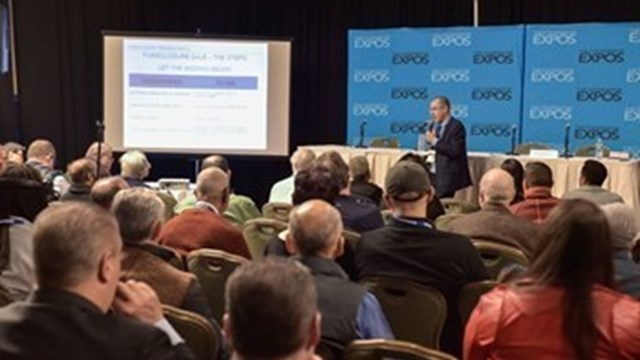
Whether they’re managing a small walk-up building in the city center or a sprawling development in a more suburban area, property managers handle a wide array of tasks, from physical stuff to administrative chores. While many of these jobs can be described in concrete terms (like sending out monthly bills, attending meetings, and filing paperwork), one important component is harder to pin down: the actual management of people—specifically, building and association staff members.
A manager might only have to coordinate operations with a single superintendent, chief engineer, resident manager (or whatever term they’re called), or he or she might work with any number of doormen, porters, custodians and others, depending upon the size and type of community.
But even a great, experienced property manager may not be an expert in human resources management. That’s why a good understanding of HR—through knowledge of best practices and continuing education courses—is an important part of running a peaceful, efficient community. Having these skills will enable property managers to improve their staff members’ performance, while making their own jobs and others’ jobs much easier in the process. All of that can be achieved, with the added benefit of fewer headaches for the board and residents.
Staff, Not Jobs
In the context of property management in a city like Chicago and its outlying communities, human resources is concerned with having qualified people doing their jobs correctly—and that happens with the right leadership.
“Property management is all about staff,” says Jim Stoller, president of The Building Group, a condo management firm in Chicago. “HR is our highest cost and biggest concern—you’ve got to get the right people in the right places.”
In residential buildings in the Windy City, human resources involve knowing the established rules of conduct for employees, as well as for working with employees. With many buildings, that means knowing the guidelines set out in the union contract.
“Frequently, clients are union buildings, with parking garage, janitorial and other staff in one union or another,” says Richard Holtzman, president of Prairie Shores Property Management in Chicago. “It’s pretty easy to work with them because they have an agreement with the building. You follow the pay, record keeping, and other rules.”
And while it’s important for managers to have a good rapport with their staff, and to have the right people working in the correct positions, too much familiarity can breed inefficiency and sometimes, contempt. Familiarity can sometimes get in the way of sound decision-making. Perhaps the biggest mistake that inexperienced managers make when it comes to avoiding staff issues and running a harmonious, cooperative community is letting their feelings about an employee cloud their judgment, says Brian Lozell, director of condo management for Chicago-based Seneca Real Estate Advisors.
“They let personalities get in the way, and hold off on discipline based on personal feelings about the individual,” Lozell says. “If a staff member is well-loved, it can make discipline a tricky thing. I personally had a situation where I fired an employee, and it almost cost us the contract.” The firing of the doorman was justified, and it was ultimately upheld by the union, Lozell says. “But it didn’t make the board happy.”
Problems with inexperienced managers also can happen when the community simply has too many chiefs. An excess of leaders can result in a leadership vacuum. “All work needs to go through the management team. But if every board member is telling staff what to do, work falls apart,” Stoller says. “Our best clients are our educated clients. They understand how the systems work.”
At the Ready
Not being prepared with contingency plans is another common managerial flub. The inexperienced manager might fail to account for scheduled employee vacation time, or not have the staff flexibility to cover sick day call-ins. “I’ve actually served as a doorman to ensure the building had that service. It fell upon me to be there—with a smile on my face,” Holtzman says.
One common problem that arises among association staff members has to do with underfunding. More often these days, the board wants management to do the same jobs for the building, but with fewer man hours and/or fewer personnel handling those tasks. Some management firms believe getting the formula of man-hours to necessary tasks just right is of primary importance, and tackle it early on.
“One of the first things we do [after being hired] is review staffing for the association. We get the right people in the right place, with weekend and emergency coverage,” Stoller says.
Alecia Pinkdon, a Chicago property manager working with various client buildings, agrees that scheduling of employees can be problematic if the manager doesn’t schedule strictly according to the building’s necessities.
“You need to cover the property as much as possible,” Pinkdon says, adding that it’s not always an easy task. With one community she serves, the board required her to lay off some staff members in cutbacks, then an employee quit. But the schedules still had to be covered.
Education and Training
Knowledge can be especially helpful in running a community well, which is why work experience matters a lot in the real estate industry. And employees—both property managers and building staff—can benefit from training to improve their job performance. Sometimes, though, they need a little help. Managers acquire the skills to professionally deal with staff through on-the-job training and continuing education. Obviously, it helps if a management firm has a training program (as many do), but many managers also have learned while they earned, being mentored by a more experienced worker. But in this business, the more a pro knows, the better he will be.
Experts suggest that managers avail themselves of human resources training that is provided through organizations such as the local Illinois chapter of the Community Associations Institute (CAI-Illinois) and the Institute of Real Estate Management (IREM). After all, a property manager is expected to be an expert in anything that comes up, Stoller says.
Two unions in Chicago—SEIU Local 1 and IUOE Local 399–represent workers from a variety of fields including janitors, security officers, stadium and theater workers, doormen and resident managers, chief engineers, superintendents and maintenance workers. The Service Employees International Union (SEIU) represents more than 50,000 service workers in Illinois, Indiana, Wisconsin, Michigan, Missouri, Ohio, and Texas in the Local 1 chapter. It is also the largest property services union nationally, with 225,000 members in the building cleaning and security industries, including janitors, door men and women. SEIU is also the largest health care and public services union, with 900,000 and 850,000 members in those fields, respectively.
Local 399 is the local chapter of the International Union of Operating Engineers (IUOE) in Chicago. The chapter primarily represents both private and public sector stationary engineers, service workers in buildings, facilities, and petro-chemical centers.
Both unions offer a variety of training courses and seminars to educate, train and meet industry demand.
Courses can be helpful in teaching a manager how to deal with HR issues, but sometimes experience, coursework and the like won’t suffice. With many doormen, maintenance staff and other employees represented by unions, sometimes an expert such as an employment attorney must be consulted. “In too many cases, people want to sue,” Stoller says.
While attorneys may need to be consulted if a situation with an employee gets dicey, seasoned managers avoid such situations whenever possible. “Primarily, it’s experience, that’s why it’s called human resources. Management companies should have experience in the issues coming up in the client’s building,” Holtzman says.
With Prairie Shores Property Management, the company’s protocols regulate employee behavior, Holtzman says. Areas covered by the company’s policies include inventories, purchases, tardiness, absenteeism, and other areas.
“Over the years we’ve had problems with demeanor… We have a handbook for on-site employees, which helps,” Holtzman says, adding that courtesy titles are a matter of course. “We insist our door staff refers to residents as ‘Mr. This’ or ‘Mr. That,’ out of respect.”
In a very real way, friendliness is part of the job skill set of employees who serve in a residential community, since most will be interacting with residents at least some of the time. But similar to how things can be twisted if one employee becomes a favorite of board members (as with the aforementioned doorman who had to be fired), when an employee becomes too chummy with residents, that also can lead to problems.
“When employees become personally friendly with residents that complicates things,” Lozell says, noting that it can lead the employee to be “chatting with someone, rather than helping another who’s struggling with packages… What if you’re one of those who the doorman isn’t buddy-buddy with?”
In the same vein as cautioning against favoritism between employees and residents, certain practices that might be common in some buildings are forbidden in others, such as tipping. Several properties that Seneca Real Estate Advisors work with have policies against tipping employees.
“I think it’s a great idea,” Lozell says. “I don’t want to feel obligated to give a guy twenty bucks to get help from him.”
Much of the behavior or inaction of employees that managers want to see changed can be navigated simply by clearing the air. Managers need to be honest with the staff. In part to do so, The Building Group creates job descriptions for every employee, and talks with them about them.
While employees of some buildings don’t take advantage of continuing education through the unions that they are offered as members of those unions, they’d better themselves by doing so. Industry pros suggest that if possible, the building or association enable the staff to be paid on work time while taking those classes, as a way to entice employees to take the courses.
Management firms like The Building Group also encourage their own employees to take continuing education courses through CAI and IREM. The Building Group has an in-house continuing education program, with courses covering employment law, engineering and other aspects of property management.
Just as an association wouldn’t want a doorman attempting boiler repairs, board members also should mind their business—and only their business. The board’s role is not to manage the building, that’s the property manager’s job. The board should be observing how things are going in the building, and they should report any problems to management, as well as setting policy, of course. “They should be making decisions about quality of life in the building, and rely on management to do their job,” Holtzman says.
Some managers admit that the ability to fire an employee is perhaps the best motivator to turn around a staffer’s performance. But getting a dysfunctional staff back on track needn’t be a blatant carrot-stick approach, though aspects of the approach can help. Pinkdon prefers offering the carrot to build rapport with employees. She likes to help the employee to earn a bit more, while getting work done in the building that needs to be taken care of anyway.
“I set up special projects for them on occasion. You always can encourage them with money,” Pinkdon says.
And there’s also a more indirect way to educate staff: teaching by display.
“As I’m talking to you, I’m deadheading geraniums, so the staff can see I’m willing to do anything I’d ask them to do,” Lozell says to a reporter he’s talking on the phone with for this story. “It’s about showing and teaching and growing… I get in the trenches with them.”
Jonathan Barnes is a freelance writer and a frequent contributor to The Chicagoland Cooperator.






Leave a Comment